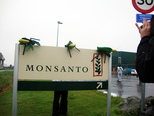
In what is being hailed by many as a historic decision, Monsanto has been found liable for the chemical poisoning of a farmer by a French court. In 2004 a 47 year old farmer sued Monsanto for chemical poisoning, that he claimed to have received after cleaning his sprayer tank equipment. The farmer used Monsanto's Lasso weedkiller formula, which contained the active ingredient Alachlor. It was alleged that the Alachlor caused the farmer lifelong nerve damage, persistent memory loss, chronic headaches, a speech impediment and rendered him permanently occupationally disabled.
The court found Monsanto negligent in failing to provide proper and adequate warning of exposure dangers on the Lasso packaging. The farmer's lawyer maintains that this is the first time that a pesticide manufacturer has been found liable for such type of poisoning. According to the U.S. Environmental Protection Agency (EPA), exposure to Alachlor may cause damage to the liver, kidneys, spleen and eyes and may even cause anemia and cancer. In fact, the EPA apparently determined Alachlor to be so hazardous that it set the Maximum Contaminant Level Goal (MCLG) at zero, in order to "prevent potential health problems".
In 2007, France officially banned Lasso in accordance with a European Union (EU) directive enacted in 2006, prohibiting the chemical from being used on crops. Despite the EU prohibition and all of the known potential dangers from Lasso, the chemical is still being used on conventional crops throughout the United States to this very day. The court has yet to determine the amount of compensation Monsanto will be required to pay the farmer.
Long Island Lawyer
Paul A. Lauto, Esq.


 RSS Feed
RSS Feed

